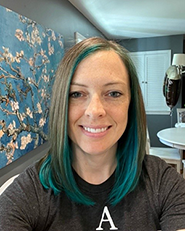
(Posted 2024 September)
Meet Amanda Snelgrove, HASA (Hospital Accompaniment Support Advocate) and Hotline Volunteer
 Tell us a little about yourself. What is your professional background?
Tell us a little about yourself. What is your professional background?
I was a small animal veterinarian for nine years in the Arlington and Alexandria areas. I left my career and the veterinary field two years ago due to my mental health and to be more present for my kids. I also felt I had another calling that veterinary medicine was not fulfilling. I really wanted to help people on a community level.
How long have you been volunteering? What led to your initial desire to volunteer and serve others?
I have been a DSVS volunteer for under a year. I also volunteer at my older son’s elementary school in Fairfax County. My desire to volunteer was just to give back to my community. I grew up in a rural area, and we depended on the community. Now I live in a larger area where everyone is so isolated while being on top of each other at the same time. I just want to get to know the community now and how I can better help them.
What interested you in volunteering with Fairfax County’s Domestic and Sexual Violence Services?
Right after I left my career, I went back to school for a little bit and started working on a social justice graduate certificate. The two classes that really drove my passion to help my community were Violence Against Women and Race, Identity, and Policing. I didn’t complete my certificate program, but it guided me into discovering DSVS and volunteering.
What is the most challenging part of volunteering? How did you overcome this challenge?
Even though I am good at talking to people and I am very empathetic, I have bad social anxiety. So, meeting someone new or answering a new call on the hotline makes me anxious because you don’t know what the situation is going to be. I don’t get to prep for any of these situations. I also have a huge fear that I will say something wrong or make their trauma worse. I overcame this when a friend told me I couldn’t make their situation any worse and that by just listening and validating them, I would already get them one step forward.
What’s the best part of volunteering? Share your most memorable experience.
I love it when I’m talking to someone, listening to their traumatic story, and realizing how brave and strong they are. They made the call. They are survivors. They were brave enough to take the first step, and they realize they do not deserve what they have been through. I am proud of all of them, and I let them know. I love being their biggest cheerleader. I am in awe of these amazing people who have been through so much, and they are fighting for themselves and their children.
What has been your favorite training? What did you like about it? What did you learn?
Any training that has to do with trauma and how it changes your brain. I have learned so much from that, especially how it [trauma] affects memory and helps you survive. It was interesting, but sad to learn that even babies exposed to trauma can cause changes to their brains. It was good to learn that even with complex trauma, with the right support and therapy, there can be healing.
What are your three greatest strengths? How have you been able to display and use these strengths when serving others?
Empathy, listening, and respect for people. I could listen to some of these victims forever, which is also a problem because I need to open the hotline for the next caller. A lot of callers just want someone to listen to them and validate them. Empathy goes a long way in understanding people and their situation, even if you have never been through that before and may make different decisions. I have respect for everyone I talk to. I try not to judge them or have any biases toward them.
What advice do you have for people who may be thinking about becoming a DSVS volunteer?
Take care of yourself, too. I have had to learn to separate it from my personal life. Make sure you check in with yourself. Have a good self-care plan.
What do you wish you could do more of as a volunteer?
I want to help more, but I’m trying to balance all my duties and take care of myself and my family, too. I have a habit of throwing my whole self into things and burning out. So, I’ll take on more volunteering slowly as I get more settled into my volunteer roles.
What are some of your hobbies and interests?
I love spending time with my kids and husband. I love hiking, gardening, camping, rock climbing, and biking when I get the time.
This article posting is part of the Domestic and Sexual Violence Services' Volunteer Voices monthly newsletter for current and potential volunteers. If you're not already a volunteer, learn how to get involved. Find out about upcoming trainings, volunteer trainings, happenings around the DSVS office and information about articles, books, media recommendations and more.
Learn more about the Domestic and Sexual Violence Services (DSVS).

